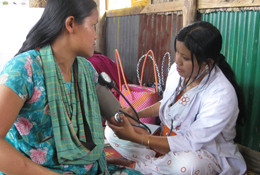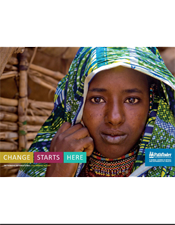Bangladesh
Bangladesh is one of the most densely populated countries in the world—and growing. The current population of Bangladesh is projected to reach 230-250 million by 2050, even if replacement fertility is reached today. With more than 2,500 people per square mile, many Bangladeshis are landless or are forced to live on and cultivate flood-prone land. About a third of the country floods during the monsoon season every year, creating a relief crisis and hampering regular development efforts. Bangladesh is also currently experiencing a nationwide shortage of trained health personnel with only five doctors for every 10,000 people on average and only one doctor per 10,000 people living in rural areas.
Bangladesh is declared by WHO as one of the 58 crisis countries facing an acute human resources for health crisis.
Pathfinder has been a leader in the reproductive health and family planning movement in Bangladesh since the early 1950s. Since that time, through more than 30 projects, Pathfinder has played a key role in helping Bangladesh develop and integrate its national family planning and maternal-child health programs, reach underserved populations, improve quality of services, and build the capacity of partner NGOs.
The Pathfinder country office was established in 1978 and since then Pathfinder has implemented numerous projects focused on improving access to reproductive health care, contraception, and education. Of those projects, three were the largest health programs in the region during their implementation. From 1978 through 2011 Pathfinder has served about 14 percent of Bangladesh's population, urban and rural, in 61 of 64 districts.
Our Projects

NGO Health Service Delivery Project (NHSDP)
The NGO Health Service Delivery Project focuses on technical assistance and capacity building to local non-government organizations to manage and provide quality services reaching underserved populations in Bangladesh.
Related Publications
Implementing Performance-based Grants For Improved NGO Performance in Bangladesh
This technical brief explores performance-based grants implementation and offers insights on the use of pay-for-performance mechanisms at the NGO level in Bangladesh.
Change Starts Here: Pathfinder International 2014 Annual Report
We believe change starts with expertly trained providers and pharmacies that never run out of supplies. It starts with open conversations among women, young people, men, religious leaders, mothers-in-law, policymakers, and others, joining to discuss their beliefs and remove barriers to their health and well-being. Our 2014 Annual Report shows a few highlights of how Pathfinder has served as a catalyst for change over the past year.
Leave No Woman Behind
It was a matter of life and death for Jenelia, who lives in a remote mountain village in Haiti, the most dangerous place to give birth in the Western Hemisphere. This issue of Pathways explores how mobile technology is changing the way community health workers are delivering health services to women like Jenelia.
Research and Evaluation Working Paper Series
The purpose of the Working Paper Series is to disseminate work in progress by Pathfinder International staff on critical issues of population, reproductive health, and development.
Related News
Chevron Donates Ambulance to Bibiyana Clinic

Saving Pregnant Mothers: Red Flag Approach
"As Mariam Bibi, near 30 with two children said in her own words, 'When I was pregnant the second time, my husband, a small trader was unable to take proper care for me. Moreover, our house is so far from upazila health complex, regular check-ups were not possible. In the mean time Surjer Hashi Clinic came forward to help me prevent health problems associated with pregnancy. They hung a red flag atop my house so that everybody could see and understand the need to help pregnant mothers like me.'"














